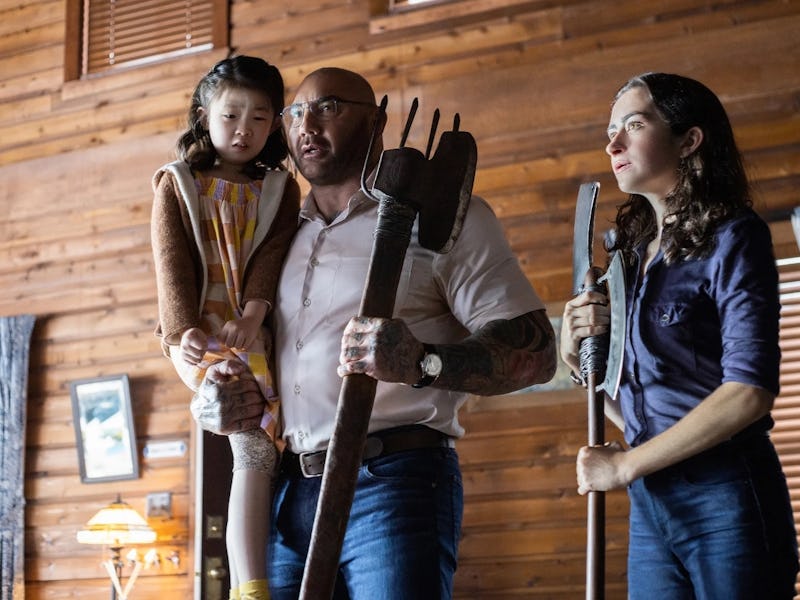Knock at the Cabin Proved M. Night Shyamalan’s Comeback is Legit
Shyamalan once again warns us about the dangers of taking a vacation.

The world is about to end. At least, that’s what four disparate strangers who come together after experiencing a series of shared visions say. They believe the apocalypse can be stopped, but it will require a sacrifice, and that sacrifice must come from a certain family.
While based on a Paul G. Tremblay novel, Knock at the Cabin is, in every way, a typical M. Night Shyamalan horror. It’s unnerving, full of striking performances (particularly by Dave Bautista), earnest and a bit cheesy, and messy as hell. It’s a glimpse into the ultimate nightmare scenario, but also a tender ode to family. It would crush a Shyamalan bingo card.
Knock at the Cabin, now available on Peacock, did well at the box office, continuing a streak of commercial success for a director who’d long been treated as a cinematic punching bag. Once reduced to a walking meme accused of having one trick in his bag, Shyamalan has revitalized his career and embraced being a unique creator in the era of IP and remakes.
Shyamalan was once positioned as the new Hitchcock. The runaway success of The Sixth Sense, which broke box office records and earned a slew of Oscar nominations, saw him heralded as a hot new talent. His next three works — Unbreakable, Signs, and The Village — began to raise critical doubts, but a new Shyamalan film became an event, an opportunity to see prestigious horror with an eye-widening twist. That fell apart very quickly with The Happening, a truly ridiculous experiment, and his wildly misguided adaptation of Avatar: The Last Airbender. Everything that once made Shyamalan intriguing suddenly felt hackneyed. The twists became trite. The dialogue was sloppy. The films took themselves too seriously.
Following the mess of After Earth, where Shyamalan did mercenary work for Will and Jaden Smith, the director returned to low-budget horror with 2015’s The Visit, about two teens who go to stay with their estranged grandparents. Audiences turned out for it and critics cautiously embraced it. Shyamalan was back.
He didn’t necessarily change his style or approach. He still has corny moments. He still gives himself cameos that drive home his lack of acting talent. His work has always been silly, but you could argue he’s doubled down, and citing the rapper named Mid-Sized Sedan in Old would be strong evidence. There’s an unfettered quality to the likes of Split, The Visit, and Knock at the Cabin, works that embrace traditional horror but are more interesting in how they revel in the absurd. Taking silliness seriously is one of Shyamalan’s greatest strengths.
Shyamalan has always been a technically focused filmmaker. Aside from his impeccable ability to create near-unbearable tension, he has a knack for finding the middle point between pulp grime and high prestige. The Village, one of his best, is stunningly shot by Roger Deakins and feels like a Grimm fairy tale. Even when he gets his shlock on, like with The Visit, he doesn’t sacrifice that flair.
Vacation plans are interrupted by a tremendously compelling Dave Bautista.
Knock at the Cabin sees Shyamalan firing on all cylinders, but still with the restraint that’s defined his post-Last Airbender career. The budget is small and the focus is limited largely to a couple spaces, but it’s certainly not short of ideas or moments of balletic camera work. The film faced criticism for defanging its source material’s bleakness, but it wouldn’t be a Shyamalan film without an aching sense of hope for his fellow man. Shyamalan seldom shies away from utter horror, but he still believes in basic human goodness. He has a nasty streak, but the earnestness is where he shines, whether it’s in The Village’s love story or the old-school good versus evil superhero battle in Unbreakable.
That’s the part of Knock that lingers long after the credits roll. At its center is two men and their daughter, who are forced to make a traumatizing choice. The fate of the entire planet rests on one of them being murdered at the hands of a loved one. Is it worth it? The perennial battle between faith and reason (similar to another of Shyamalan’s stronger films, Signs) is suffocating for characters and viewers alike. Could you do what they’re tasked with? Shyamalan removed the dark ambiguity of the novel, but he makes up for it by pushing its philosophical ideas to their extreme.
While Shyamalan’s box office numbers prove he’s the rare director who can pull in big bucks with original, low-to-mid-budget films, you get the sense that, at this point, he doesn’t care about appealing to the masses. He refused to temper his weirder cinematic indulgences, even after they became the subject of mockery. He's turned to self-funding over studio checkbooks to ensure his work remains as undiluted as possible, and the decision is paying off. Audiences have welcomed him back, and some of his failures have been critically reassessed. He signed a first-look deal with Warner Bros. last year, ensuring many more Shyamalan films in our future. Next is Trap, a thriller about a sting operation to capture a notorious serial murderer at a pop concert. If it’s half as fascinating as Knock at the Cabin, we’ll buy our tickets.
Knock at the Cabin is streaming on Peacock.